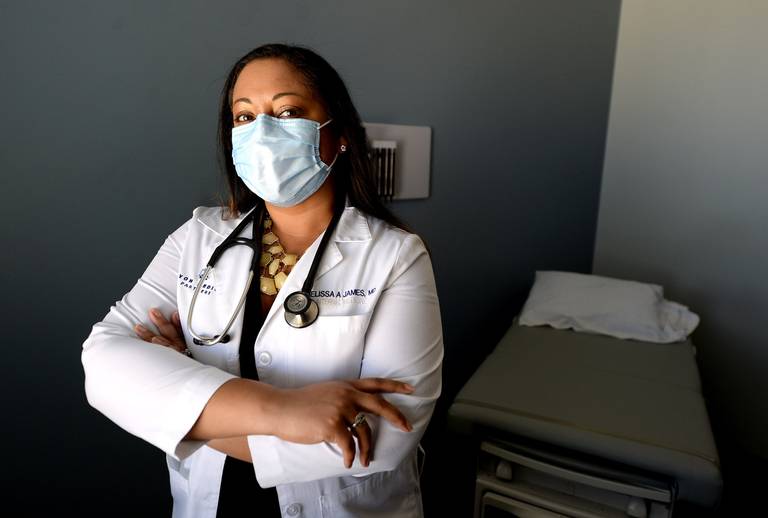Tryon Medical’s Dr. Melissa James shared her story on a year of treating COVID-19 patients with reporter Melba Newsome. Dr. James reflects on her first encounter with coronavirus, patients she’s lost and the sacrifice required to get some to take the virus seriously.

Excerpts of the story, produced in partnership with the Pulitzer Center, are below. We encourage you to read the entire story co-published in The Charlotte Observer, The Charlotte Post and N.C. Health News.
Melissa James can still recall meeting her first coronavirus patient. A woman — probably in her mid-30s — came to the SouthPark office in late February 2020 complaining of lingering respiratory problems she thought might be allergies or a cold she couldn’t shake.
James asked a series of screening questions about the patient’s travel, activities and if she’d come in contact with anyone who’d been abroad recently.
“We had this friend who just traveled and he had this cold but it wasn’t a big deal,” the patient told her. “They were doing research in Wuhan.”
Even without the pandemic, 2020 was expected to be a challenging year for James and her medical partners. In 2018, she was one of more than 80 doctors who launched a legal battle to contest Atrium’s non-compete clause and form Tryon Medical Partners. Now, just one year into building a medical practice from the ground up, the group had to effectively diagnose and treat patients in the middle of a pandemic when personal protective equipment, testing supplies and good information could be hard to come by.
Fortunately, the practice had testing supplies on hand by the time that first patient came in with her respiratory complaints. Getting results took about 10 days. As James had expected, the woman was positive for COVID-19.
As a primary care doctor, James treats patients of every race, ethnicity and socioeconomic strata. They range in age from 18 to 102. However, it didn’t take long to see the disparities take shape: People of color got very sick, very quickly and had the worst outcomes, she said.
Primary care physicians are tasked with signing the death certificate for any patient of record who dies while in the hospital. James believes her signature is on 40 to 50 death certificates for patients who died of COVID-19 in the past year.
“It’s heartbreaking, sad and upsetting and you never get used to it,” James said. “I get invested in my patients. I take very detailed notes so I remember that you told me you just moved here from Alabama because of your Nana, or whatever. I get nervous having to make the phone call to speak to the next of kin but I always call.”
Tryon Medical was one of the first practices in Charlotte to become involved in the COVID vaccine trials. Prior to COVID, the practice had been working with the integrated research organization, Javara, on another project. Javara was contracted to conduct trials for Moderna and asked Tryon if they would participate.
“If we could be a part of the solution and get the world back to a sense of normalcy, absolutely. We will do that!” James said. “And then obviously, you’d have to convince your patients to sign up for it.”
Being a primary care physician affords James the time to develop relationships and build trust with her patients so that when she tells them something, they listen — most of the time. That is particularly important when it comes to not just participating in the vaccine trial but also getting vaccinated.
“For every patient who tells me I’m not getting it, my first question is ‘why?’ and then I go into ‘let me educate you.’ I always just keep it real with them,” she said. “That makes it a little easier 90 percent of the time, but then there’s that 10 percent who say ‘I won’t do it, I don’t care what you say!’”
